Eating Vegetable
Eating vegetables can be one of the most important things you do to keep your body healthy and protect against disease, so you must get enough of them into your diet every day. But which vegetables should you eat? The following 10 are particularly full of nutrients, vitamins, and other healthy substances, making them worth your time and effort to incorporate into your meals regularly.
Table of Contents
Toggle1) Spinach

This leafy green is low in calories and packed with nutrients, like iron and vitamin K. It’s also high in lutein and zeaxanthin, two antioxidant compounds that can help fight macular degeneration and protect your eyes from sun damage. According to a recent study in The Journal of Nutrition, it’s one of your best bets when it comes to preventing memory loss as you age.

2) Avocado
The versatile green fruit. Besides tasting great, avocados are rich in vitamins and minerals, such as vitamin C and folate, making them a nutrient-dense choice for your diet. Avocados also have heart-healthy fats that can reduce your risk of heart disease by lowering cholesterol levels and preventing blood clots.
3) Broccoli

Broccoli is known for its cancer-fighting properties, but it may also prevent dementia and improve memory. It is an excellent source of vitamin C and fiber. Use it to make a delicious stir-fry or use it as an ingredient in soup or pasta dishes. Try roasting it with olive oil and garlic to add even more flavor. Cauliflower: Like broccoli, cauliflower is known for its brain-boosting benefits; however, while broccoli boasts better protection against Alzheimer’s disease, cauliflower appears to do more when it comes to improving memory. This cruciferous vegetable can be eaten raw or cooked.

4) Mushrooms
If there’s one health food that always gets a bad rap, it’s mushrooms. Most people have heard at least something negative about them—they cause weight gain, they’re super high in calories, they have weird textures, and so on. But is it all true? Not really. When it comes to most veggies (especially mushrooms), it is essential to remember that what isn’t considered is how filling they are; since most veggies are low-calorie/high-volume, we tend to feel fuller faster than when we eat foods with more calories per bite.
5) Vegetable number 5 Asparagus

One of nature’s most nutrient-rich veggies, asparagus is a cruciferous powerhouse. Cruciferous veggies help keep our bodies in tip-top shape, so we recommend picking up a bundle of asparagus every week. Be sure to snap off just the end (avoiding any challenging parts), toss it with a bit of olive oil and lemon juice for an antioxidant blast, and roast until it turns brown on both ends. Sprinkle Parmesan cheese over the top for more flavor. Roasted asparagus tastes excellent alone or with lean protein like fish or chicken breast.

6) Bell Peppers
Bell peppers are an excellent source of vitamin C, which is necessary for collagen production. Collagen is essential because it keeps your skin elastic and plump. Aside from that, bell peppers are high in antioxidants, which help fight wrinkles and other signs of aging. These include beta-carotene, lutein, and zeaxanthin. So eat up! Not only will you look younger but feel younger too!
7) Vegetable number 7 Lettuce

The first vegetable on our list is Lettuce. Even though it’s commonly used for salads, it is also great in wraps and sandwiches. Due to its high water content, it can also help curb your appetite, keeping you from snacking on unhealthy foods throughout the day. Plus, a cup of Lettuce contains roughly 3 grams of fiber, so it’s a perfect addition to a healthy diet.

8) Cucumber
Cucumbers are abundant in water, making them an excellent choice for hydrating your body. Not only that, but cucumbers also have anti-inflammatory properties and help aid digestion with their fiber content. They’re also filled with vitamin K and potassium, two nutrients essential for bone health. Cucumbers contain smaller amounts of vitamins A and C and plenty of other essential minerals like manganese and copper.
9) Vegetable number 9 Lettuce

Celery is an excellent source of vitamin K, potassium, and vitamin C and a good source of folate and calcium. It’s also low in calories—100 grams of celery contain only 20 calories. Not only that, but it’s a great weight-loss food because it is very filling; one study found that subjects consumed fewer calories during lunch when a salad with celery was on their plate. Still, have room for dessert?

10) Sweet Potato
This superfood can not only lower your cholesterol but also help regulate blood sugar. Sweet potato is rich in vitamin A and C and packs a punch for healthy nutrients. It has no fat or cholesterol and is low in calories. The best part: Sweet potatoes are packed with fiber, so they help keep you feeling full for more extended periods. A one-cup serving will give you about 110 calories, as well as 4 grams of fiber. Just make sure to watch out for all that sodium!






